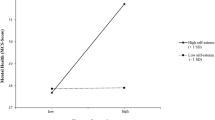Abstract
Epidemiologists have long been aware that social and environmental factors can contribute to the incidence of many human diseases. Predictably, as the single activity occupying most people’s waking time is work, pressures, strains, and stresses within the workplace have been identified as being a potentially important health factor. Numerous theories now exist, developed from a wide range of perspectives, postulating a direct link between organisational/workplace stress and wellbeing.1
Access this chapter
Tax calculation will be finalised at checkout
Purchases are for personal use only
Preview
Unable to display preview. Download preview PDF.
Similar content being viewed by others
References
Cooper CL, ed. The theories of organisational stress. Oxford: Oxford University Press, 1999.
Kenny DT, Carlson JG, McGuigan FJ, et al, eds. Stress and health: research and clinical applications. Amsterdam: Harwood Academic Publishers, 2000.
Cooper CL. Can we live with the changing nature of work? Journal of Managerial Psychology 1999;14:569–72.
Paoli P. First Europeon Survey on the Work Environment 1991–1992. Dublin: European Foundation far the Improvement of Living and Working Conditions, 1992.
Cooper CL, ed. Manogerial, occupational and orgonisational stress research. Dartmouth, 2001.
Tail M, Padgett MY, Baldwin TT. Job and life satisfaction: a re-evaluation of the strengths of the relationship and gender effects as a function of the dote of the study. J Appl Psychol 1989;74:502–7.
Iaffaldno MT, Muchinsky PM. Job satisfaction and job performance: a meta-analysis. Psychal Bull 1985;97:251–73.
Hunter JE, Schmidt FL. Methods of meta-analysis: correcting error and bias in research findings. London: Sage, 1990.
Oshagbemi T. Overall job satisfaction: how good ore single vs. multiple-item measures? Journal of Managerial Psychology 1999;14:388–403.
Warr P, Cook J, Woll T. Scoles far the measurement of some work attitudes and ospects of psychological well-being. J Occup Psychol 1979;52:129–48.
Winefield AH, Tiggemann M, Goldney RD. Psychological concomitants of satisfactory employment and unemployment in young people. Soc Psychiatry Psychiatr Epidemiol 1988;23:149–57.
Wanous JP, Reichers AE, Hudy MJ. Overall job satisfaction: how good are single item meosures? J Appl Psychol 1997;82:247–52.
Sousa-Poza A, Sousa-Poza AA. Well-being at work: a cross-sectional study of the levels and determinants of job satisfaction. Journal of Socio-Economics 2000;29:517–38.
Warr P. The measurement of well-being and other aspects of mental health. J Occup Psychol 1990;63:193–210.
Cooper CL, Sloan SJ, Williams S. Occupational stress indicator: management guide. Windsor: NFER-Nelson, 1988.
Cammann C, Fichman M, Jenkins D, et al. The Michigan Organizational Assessment Questionnaire. University of Michigan, Ann Arbor, 1979.
Hackman JR, Oldham GR. Development of the Job Diagnostic Survey. J Appl Psychol 1975;60:159–70.
Kinicki AJ, McKee-Ryan FM, Schriesheim CA, et al. Assessing the construct validity of the Job Descriptive Index: a review and meta-analysis. J Appl Psychol 2002;87:14–32.
Weiss DJ, Dawis RV, England GW. Manual for the Minnesota Satisfaction Questionnaire. Minnesota Studies in Vocotional Rehabilitation (No. 22). 1967.
Brayfield AH, Rothe HF. An index of job satisfaction. J Appl Psychol 1951;35:307–11.
Lipsey MW, Wilson DB. Practical meta-analysis. Thousand Oaks, CA: Sage, 2001.
Rosenthal R, Rosnow RL, Rubin DB. Contrasts and effect sizes in behavioural research. Cambridge: Cambridge University Press, 2000.
Borenstein M, Rothstein H, Cohen J. “Comprehensive meta-anolysis”manual. New Jersey: Biostat Inc., 2001.
Cahen J. Statistical power analysis for the behavioural sciences, rev. edn. New York: Academic Press, 1977.
Steering Committee of the Physicians’ Health Study Research Group. Preliminary report: findings of the aspirin component of the ongoing physicians’ health study. N Engl J Med 1988;318:262–4.
Greenland S, Schlesselman JJ, Criqui MH. The fallacy of employing standardised regression coefficients and correlations os measures of effect. Am J Epidemiol 1986;123:203–8.
Burke RJ. Work stressors among recent business school graduotes. Stress Med 1998;14:83–9.
Noblet A, Rodwell J, McWilliams J. The job strain model is enough for monagers: no augmentation needed. Journol of Managerial Psychology 2001;16:635–49.
Scarpello V, Campbell JP. Job satisfaction and the fit between individual needs ond organisational rewords. J Occup Psychol 1983;56:315–28.
Giga S, Forogher EB, Cooper CL. Identification of good practice in stress prevention management: a state of the art review. Report commissioned by the Health and Safety Executive. University of Manchester Institute of Science ond Technology, 2002.
Murphy LR, Cooper CL, eds. Healthy and productive work. London: Taylor and Froncis, 2000.
Editor information
Editors and Affiliations
Copyright information
© 2013 E. Brian Faragher, M. Cass, and Cary L. Cooper
About this chapter
Cite this chapter
Faragher, E.B., Cass, M., Cooper, C.L. (2013). The Relationship between Job Satisfaction and Health: A Meta-Analysis. In: Cooper, C.L. (eds) From Stress to Wellbeing Volume 1. Palgrave Macmillan, London. https://doi.org/10.1057/9781137310651_12
Download citation
DOI: https://doi.org/10.1057/9781137310651_12
Publisher Name: Palgrave Macmillan, London
Print ISBN: 978-1-349-33630-2
Online ISBN: 978-1-137-31065-1
eBook Packages: Palgrave Business & Management CollectionBusiness and Management (R0)




